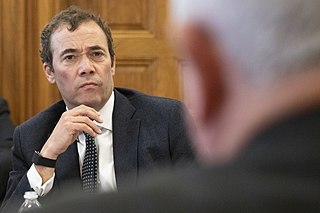Related Research Articles

Keith Rupert Murdoch is an Australian-born American business magnate, media proprietor, and investor. Through his company News Corp, he is the owner of hundreds of local, national, and international publishing outlets around the world, including in the UK, in Australia, in the US, book publisher HarperCollins, and the television broadcasting channels Sky News Australia and Fox News. He was also the owner of Sky, 21st Century Fox, and the now-defunct News of the World. With a net worth of US$21.7 billion as of 2 March 2022, Murdoch is the 31st richest person in the United States and the 71st richest in the world according to Forbes magazine.

ITV Digital was a British digital terrestrial television broadcaster which launched a pay-TV service on the world's first digital terrestrial television network. Its main shareholders were Carlton Communications plc and Granada plc, owners of two franchises of the ITV network. Starting as ONdigital in 1998, the service was re-branded as ITV Digital in July 2001.

Sky Group Limited is a British media and telecommunications conglomerate, which is a division of Comcast, and headquartered in London. It has operations in the United Kingdom, Ireland, Germany, Austria, Switzerland and Italy. Sky is Europe's largest media company and pay-TV broadcaster by revenue, with 23 million subscribers and more than 31,000 employees as of 2019. The company is primarily involved in satellite television, producing and broadcasting. The current CEO is Dana Strong.

News Corporation, also variously known as News Corporation Limited, was an American multinational mass media corporation controlled by media mogul Rupert Murdoch and headquartered at 1211 Avenue of the Americas in New York City. Prior to its split in 2013, it was the world's largest media company in terms of total assets and the world's fourth largest media group in terms of revenue, and News Corporation had become a media powerhouse since its inception, dominating the news, television, film, and print industries.

News Corp UK & Ireland Limited is a British newspaper publisher, and a wholly owned subsidiary of the American mass media conglomerate News Corp. It is the current publisher of The Times, The Sunday Times, and The Sun newspapers; its former publications include the Today, News of the World, and The London Paper newspapers. Until June 2002, it was called News International plc. On 31 May 2011, the company name was changed from News International Limited to NI Group Limited, and on 26 June 2013 to News UK.

James Rupert Jacob Murdoch is a British-American businessman, the younger son of media mogul Rupert Murdoch, and was the chief executive officer (CEO) of 21st Century Fox from 2015 to 2019.

Virgin Media is a British telecommunications company, founded in 2007, which provides telephone, television and internet services in the United Kingdom. Its headquarters are at Green Park in Reading, England. A range of videos advertising the company remain available on YouTube. It is owned by Virgin Media O2, a 50:50 joint venture between Liberty Global and Telefónica.

William Lewis is a British media executive and was formerly chief executive of Dow Jones and Company and publisher of The Wall Street Journal. Earlier in his career he was known as a journalist and then editor.
The foundation of the Premier League in English football occurred in the early 1990s. A proposal for the establishment of a new league was tabled at the end of the 1990–91 season. It received the support of representatives of all eighteen First Division clubs, as well as The Football Association (FA) through its "Blueprint for the Future of Football" publication. The Premier League was actualised in stages: the signing of the Founder Members Agreement on 17 July 1991, clubs handing a joint notice of resignation from the Football League, and the final go-ahead from the FA who administered affairs.
Tony Ball is a British television executive, former chairman of Kabel Deutschland and former CEO of BSkyB.

The News International phone hacking scandal was a controversy involving the now-defunct News of the World and other British newspapers owned by Rupert Murdoch. Employees of the newspaper were accused of engaging in phone hacking, police bribery, and exercising improper influence in the pursuit of stories.
The British media company Sky UK has incurred criticism over the years, much of it centred on overcharging, anti-competitive practices, and the business practices and undue political influence of its one-time majority owner News Corporation.
The Chipping Norton set is a group of media, political and show-business acquaintances who have homes near the market town of Chipping Norton in Oxfordshire, England. Chipping Norton is located approximately 75 miles from London. The group gained media attention in the wake of the News International phone hacking scandal, which directly involved members of the group.
The News Corporation scandal involves phone, voicemail, and computer hacking that were allegedly committed over a number of years. The scandal began in the United Kingdom, where the News International phone hacking scandal has to date resulted in the closure of the News of the World newspaper and the resignation of a number of senior members of the Metropolitan Police force.
The News of the World phone hacking scandal investigations followed the revelations in 2005 of voicemail interception on behalf of News of the World. Despite wider evidence of wrongdoing, the News of the World royal phone hacking scandal appeared resolved with the 2007 conviction of the News of the World royal editor Clive Goodman and the private investigator Glenn Mulcaire, and the resignation of editor Andy Coulson. However, a series of civil legal cases and investigations by newspapers, parliament and the police ultimately saw evidence of "industrial scale" phone hacking, leading to the closure of the News of the World on 10 July 2011. However, the affair did not end there, developing into the News Corporation ethics scandal as wrongdoing beyond the News of the World and beyond phone hacking came to light.
In mid-2011, out of a series of investigations following up the News of the World royal phone hacking scandal of 2005–2007, a series of related scandals developed surrounding other News Corporation properties—where initially the scandal appeared contained to a single journalist at the News of the World, investigations eventually revealed a much wider pattern of wrongdoing. This led to the closure of the News of the World on 10 July 2011, an apology by Rupert Murdoch in an advertisement in most British national newspapers, and the withdrawing of News Corporation's bid to take over the majority of BSkyB shares it did not own.
The news media phone hacking scandal is a controversy over illegal acquisition of confidential information by news media organizations that reportedly occurred in the United Kingdom, the United States and Australia between 1995 and 2011. This article includes reference lists for various topics relating to that scandal.
By 2002, the practice of publications using private investigators to acquire confidential information was widespread in the United Kingdom, with some individuals using illegal methods. Information was allegedly acquired by accessing private voicemail accounts, hacking into computers, making false statements to officials to obtain confidential information, entrapment, blackmail, burglaries, theft of mobile phones and making payments to officials in exchange for confidential information. The kind of information acquired illegally included private communication, physical location of individuals, bank account records, medical records, phone bills, tax files, and organisational strategies.

This is a chronological list of key newspaper articles that made significant new public disclosures about the illegal acquisition of confidential information by news media companies.

Twenty-First Century Fox, Inc., doing business as 21st Century Fox (21CF), was an American multinational mass media and entertainment conglomerate that was based in Midtown Manhattan, New York City. It was one of the two companies formed on June 28, 2013, following a spin-off of the publishing assets of the old News Corporation as News Corp.
References
- 1 2 Nils Pratley, The Guardian , 12 July 2011, News Corp needs all of BSkyB
- ↑ "BSkyB knocks back Murdoch takeover bid". The Spy Report. Media Spy. 15 June 2010. Archived from the original on 13 January 2011. Retrieved 3 March 2011.
- ↑ Browning, Jonathan; Larson, Erik (4 November 2010). "News Corp. Seeks EU Antitrust Approval for Proposed BSkyB Deal". Bloomberg. Retrieved 3 March 2011.
- ↑ "EU clears Rupert Murdoch's News Corporation BSkyB bid". BBC News. 21 December 2010. Retrieved 3 March 2011.
- 1 2 3 Chandrasekhar, Indu; Wardrop, Murray; Trotman, Andy (13 July 2011). "News of the World phone hacking scandal: timeline". The Daily Telegraph. London. Archived from the original on 14 July 2011. Retrieved 14 July 2011.
- ↑ The Observer , 24 July 2011, News International 'bullied Liberal Democrats over BSkyB bid'
- ↑ Watt, Holly (20 December 2010). "Vince Cable: I could bring down the Government". The Daily Telegraph. London. Archived from the original on 8 January 2011. Retrieved 21 December 2010.
- ↑ Norman Smith (21 December 2010). "Vince Cable said he could quit coalition if pushed". BBC. Retrieved 21 December 2010.
- ↑ The Guardian , 10 May 2011, Daily Telegraph censured by PCC over Vince Cable tapes
- ↑ "Vince Cable criticises Murdoch takeover in secret tapes". BBC. 21 December 2010. Retrieved 21 December 2010.
- ↑ Patrick Wintour, "Humiliated Vince Cable stripped of Sky role after 'war with Murdoch' gaffe", The Guardian, 21 December 2010. Retrieved 23 January 2011.
- ↑ The Guardian , 23 July 2011, News Corp boss 'linked' to leak of Vince Cable's Rupert Murdoch comments
- ↑ "News Corp-Sky spotlight shifts to Hunt". The Spy Report. Media Spy. 23 December 2010. Archived from the original on 29 April 2011. Retrieved 3 March 2011.
- ↑ "Hunt gives green light to News Corp-Sky deal". The Spy Report. Media Spy. 3 March 2011. Archived from the original on 7 March 2011. Retrieved 3 March 2011.
- ↑ The Independent , 23 June 2011, Hunt set to give go-ahead to BSkyB deal next week
- ↑ Mulholland, Hélène & Robinson, James (4 July 2011). "Milly Dowler phone hacking: Politicians hit out over revelations". The Guardian. London. Retrieved 5 July 2011.
- ↑ "Media Standards Trust " Blog Archive " Hacked Off: Campaign for a Public Inquiry into Phone Hacking". mediastandardstrust.org. Retrieved 20 January 2015.
- ↑ Barr, Robert. "BSkyB shares plunge on News Corp bid doubts – National Business". The Miami Herald. Retrieved 14 July 2011.
- ↑ "BSkyB takeover proposal referred to Competition Commission". The Spy Report. Media Spy. 12 July 2011. Archived from the original on 15 April 2013. Retrieved 16 July 2011.
- ↑ Holton, Kate; Prodhan, Georgina (7 July 2011). "Hack job! Murdoch axes paper to save deal". Reuters. Retrieved 16 July 2011.
- ↑ "BSkyB's share price expectations reduced after scandal". Proactive Investors. 8 July 2011. Retrieved 16 July 2011.
- ↑ "News Corp's BSkyB takeover bid at risk". Al Jazeera. 12 July 2011. Retrieved 16 July 2011.
- ↑ "Withdraw the BSkyB proposal: Murdoch faces humiliation as Government backs Labour". The Spy Report. Media Spy. 13 July 2011. Archived from the original on 16 July 2011. Retrieved 16 July 2011.
- ↑ "News Corp withdraws bid for BSkyB". BBC. 13 July 2011. Retrieved 13 July 2011.
- ↑ "Facing overwhelming pressure, News Corp pulls out of bid for BSkyB". The Spy Report. Media Spy. 13 July 2011. Archived from the original on 16 July 2011. Retrieved 16 July 2011.
- ↑ "Parliamentary Debates (Hansard)" (PDF). House of Commons. 13 July 2011. Retrieved 16 July 2011.
- ↑ Sparrow, Andrew (13 July 2011). "Phone-hacking scandal + PMQs – Wednesday 13 July 2011". The Guardian. London. Retrieved 16 July 2011.